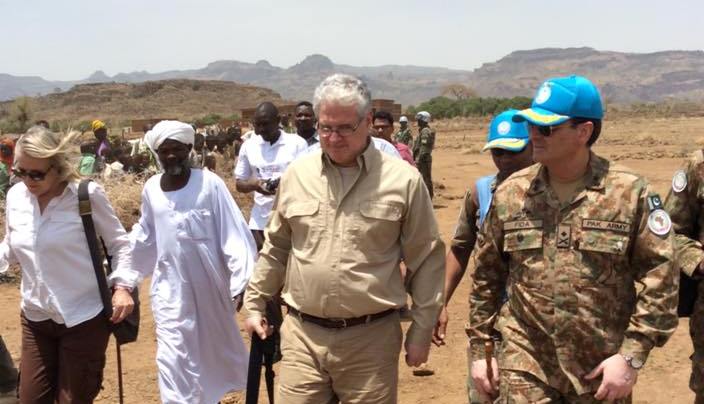Human rights were not the purpose of U.S. sanctions on Sudan: diplomat

June 26, 2017 (KHARTOUM) – U.S. Chargé d’Affaires to Khartoum, Steven Koutsis, has brushed aside calls to delay the removal of economic sanctions on Sudan next July before an improvement in the record of peace human rights and reforms.
As the deadline for the possible lift of sanctions on Sudan is approaching, activists step up calls for the delay of sanctions pointing to the need explore a new roadmap for peace and human rights in Sudan before to decide on the definitive lift of sanctions on Sudan which is expected on 12 July.
A Senior Policy Advisor at the Enough Project, Omer Ismail, last Friday even questioned the progress made by Sudan’s government on the “five tracks” agreed with Obama administration last year. Particularly he casted doubt on Khartoum’s commitment to humanitarian access and a cessation of hostilities.
In an interview with the AFP, Koutsis said Khartoum’s advances on the five tracks agreed with the government to normalise relations have been “positive”.
Regarding the human rights, the diplomat pointed they do not approve Khartoum’s policies on this respect and they marked their position when it was needed. “Washington was not blind to these issues and had “big differences” with the Sudanese government.
However, he underscored that the purpose of the sanctions was to end Sudanese support for extremist groups and bring peace to Darfur, he said.
“None of these other issues was the point of sanctions, and none of these other issues, therefore, should be linked to the lifting of sanctions,” Koutsis said.
Earlier this month, Bloomberg reported that officials at the U.S. State Department are supportive for the permanent revocation of the economic sanctions on Sudan. But this is the first time that an American diplomat makes such strong statement with regard to the lift of nearly 20-year embargo on Sudan.
However, the Business news agency was keen to say that U.S. Secretary of State Rex Tillerson hasn’t made a final decision.
Sudanese officials hope that this measure would encourage foreign investors to come to the country which was very affected by the embargo.
If the decision is positive it would also allow importing medicines, pharmaceutical products and medical equipment.
Washington imposed economic and trade sanctions on Sudan in 1997 in response to its alleged connection to terror networks and human rights abuses. In 2007, it strengthened the embargo, citing abuses in Darfur, which it labelled as genocide.
(ST)
